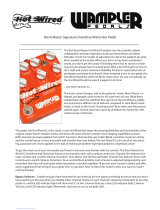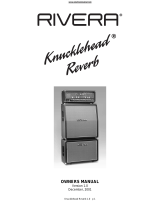Page is loading ...

Brad Paisley Signature Overdrive Pedal
Brad Paisley, international superstar and recipient of many awards, has
this to say about his signature pedal:
“...we actually recorded this (pedal) in the studio, you know, trying it out. I
turned up a Trainwreck Amp that I've got and compared the sound of the
distortion and it was very, very similar. And that's a very good test
because any time a pedal can mimic a great overdriven amp then you're
on to something...”
High praise from someone well known as an absolute tone-hound. From
TV studios to outdoor arenas, where Brad Paisley plays, there's the Paisley
Drive. Having purchased the Wampler Pedals Paisley Drive, you now have
access to exactly the same pedal that Brad Paisley uses to ensure that he
has a consistent, great sound, no matter where he's playing. When it's on,
it does its magic – you might have heard it at the Country Music Awards,
or on performances on various talk shows – and when it's o, true bypass
ensures that there's nothing getting in the way of your great starting
sound.
Since we released it, it has become a favorite of guitarists the world over,
some because they admire Brad's tone and want to get that sound for
themselves, and others because they appreciate the exibility of the
pedal in getting their own sound, in a high quality, reliable package.
Spend a little time with it, read this guide to using it, and let's add you to
that list, too!
To get the most out of your new pedal, you'll want to become very familiar with the controls. The Paisley drive
features three adjustment knobs and two switches, allowing for a great deal of exibility. With a twang-friendly single
coil guitar, you can get anything from fatter cleans to some rocking drive. With a more aggressive axe, there's enough
dirt on tap to get into a little bit of grinding distortion. And regardless of your gain needs, the EQ exibility of this
pedal is fantastic. We'll go over each control in detail, and oer some suggestions that will give you a great tone so
you don't have to start from scratch unless you want to.
Bypass Switch – Simple enough, this footswitch is wired up for true bypass switching to ensure that you don't have
anything in the way when you disable the pedal. Stomp on it to turn the pedal on, and the LED indicator light will
show that it's active.
Volume – This controls the output of the pedal. Works just like the volume knob on your guitar or your amp. As you
raise the Gain knob, and depending on how you adjust the Tone control and switches, you may need to raise or lower
this to have the same output level. That's perfectly normal. Whether you prefer a boost when you kick your overdrive
on or just about the same level as your clean tone, there should be enough range of adjustment to suit all tastes. It
isn't a super loud pedal, so if you're using a very high output guitar, you might need to raise the volume fairly high –
again, that's normal, so long as the pedal can hit unity gain (same level when you kick it on as when it's bypassed) it's
behaving as expected
TM
TM

Gain – This controls how much dirt you get from the pedal. At
lower settings, it will be very nearly clean even if you dig in. Around
9 o'clock, it starts to get some crunch when you dig in (or if you
have a high output guitar). By noon, it's really grooving, and past
there you've got the potential for real distortion. Again, this control
will interact somewhat with the Volume control. As you raise it, you
may need to lower the Volume to keep the signal level even. You'll
also nd that the same Tone settings don't work at all Gain settings.
Tone – This adjusts between a much darker, bassier sound at the
fully counterclockwise position, to a very highs-forward, present
sound fully clockwise. As with most tonal adjustments, you're
probably going to nd the right t for your gear somewhere
between the extremes. It's not a bad idea to start at noon and
adjust in small increments from there to let your ears get used to
the sound of the pedal as you raise or lower the Tone knob. The
Tone knob on this pedal doesn't stand alone, however – there are
two switches which contribute strongly to how you'll want to adjust
the Tone.
Presence Switch – This kicks in a little extra sparkle on top.
Depending on how you have the other tone controls set, it may
have more or less of an eect. If you feel like the highs need a
boost, this switch is it! The switch is ON in the up position, and OFF
in the down position.
Mid Contour Toggle – This three-way switch is the basis of the
substantial exibility of the Paisley Drive, and one of the things that
makes it stand out as possibly the most versatile three-knob
overdrive you've ever owned! Each setting completely changes the
basic voicing of the midrange frequencies, where the majority of
your guitar's notes live and breathe. It interacts with the Tone
control, the Presence Switch, and even the Gain knob, and as such it
will require some careful attention to learn completely. The bottom
position emphasizes mids in a way that can really thicken up a
guitar tone and put it right out front. The middle position pulls
everything in the midrange back, and gives the overall sound a
glassy character, great for smooth rhythm playing with a touch of
chime. The top position is a sort of balance between the other two,
and oers a fairly even sounding tone that doesn't push but also
doesn't pull the midrange. Each setting is like having a dierent
pedal underfoot, so learning to use the Mid Contour toggle is
absolutely key to getting the most out of the Paisley Drive
Power Requirements
The pedal can be powered by a 9V battery. The battery terminal is located inside the pedal.
If using a power supply, power needed for the pedal is 9V DC, regulated, center pin
negative, as supplied by most standard Boss™/Ibanez™/Etc. supplies. The pedal can be
safely powered with a multi-supply, like the Visual Sound 1SPOT™. The pedal was designed
explicitly around the usage of a 9V DC power source, and is intended to sound its best at
9V. To avoid damage to the pedal, do not exceed 18V DC, do not use center pin positive
adapters, and do not use AC power. Using an incorrect power adapter can lead to damage
and will void the warranty on the pedal. This pedal draws 9mA.
Please note: If you are using a battery, it will drain when the input cord is plugged in.
Return and Warranty Policy
For direct sales, there is a 7-day “no questions asked” period where you may return the pedal for any reason, provided that it is in its original condition. Please retain
all packaging within this period in case you decide to return it! We only require that you pay shipping back. The 7 days start when you receive the pedal. This does
not apply to dealer or retailer sales – see their individual return policies for specic information.
All Wampler Pedals, Inc. pedals carry a 5-year, fully transferable warranty that covers defects due to parts and labor. The warranty begins at the point of purchase.
Please remember to register your pedal as soon as possible after purchase at the following web page to ensure quicker service if you should ever need to make a
warranty claim: www.wamplerpedals.com/warranty_registration
For warranty repairs or questions, please feel free to contact us at www.wamplerpedals.com/contact_us.html
The Paisley Drive – Brad's Own Settings!
A Little Something Extra
What starts with a "V" and rhymes with "Socks?"
Now We're Sizzlin'!
Suggested Settings (Volume to suit)
Any trademarks attributed that are not owned by Wampler Pedals, Inc. are for
demonstrative purposes only, and are property of their respective owners
/







